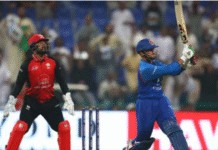 SOUTHAMPTON, United Kingdom: The world’s leading cricketers gather for the Champions Trophy in the UK that starts this week against the backdrop of a growing fixing scandal emerging from the Indian Premier League, which has already claimed several high-profile casualties.
SOUTHAMPTON, United Kingdom: The world’s leading cricketers gather for the Champions Trophy in the UK that starts this week against the backdrop of a growing fixing scandal emerging from the Indian Premier League, which has already claimed several high-profile casualties.
Such is the extent of the crisis, Narayanswamy Srinivasan, the seemingly all-powerful president of the Board of Control for Cricket in India (BCCI) temporarily stood down from his post on Sunday.
He stepped aside, but did not resign, while police investigations into his son-in-law Gurunath Meiyappan, arrested on May 24 for allegedly taking part in illegal betting on the lucrative IPL, remained ongoing.
Meiyappan is a business executive for the most successful IPL franchise, the Chennai Super Kings, which is owned by the 68-year-old Srinivasan.
The arrest of Srinivasan’s son-in-law came after three players including India paceman Shanthakumaran Sreesanth and two teammates in the IPL’s Rajasthan Royals — Ankeet Chavan and Ajit Chandila — were taken into custody. All the accused deny any wrongdoing.
Meanwhile leading Pakistani umpire Asad Rauf was stood down from officiating in the Champions Trophy after fixing allegations against him, which he too denies, were published in the Indian media.
It was just the sort of build-up the International Cricket Council (ICC) did not want ahead of a tournament which sees Pakistan returning to England for the first time since 2010.
On that occasion, three players including Test captain Salman Butt and paceman Mohammad Aamer and Mohammad Asif were banned and jailed after being caught up in a newspaper sting operation to expose match-fixing.
Officials had wanted to scrap what is now the seventh and final edition of the ‘mini World Cup’ with an inaugural World Test Championship, in a bid to boost flagging global interest in the five-day game.
However, the ICC was compelled to press ahead with this Champions Trophy when they realised they risked contravening lucrative commercial agreements with rights-holders if they did not stage a one-day tournament in 2013.
Yet, in pure cricket terms, this Champions Trophy promises to be a fascinating event.
Featuring just the sport’s top eight teams, with 15 matches to be played over 18 days from June 6-23, the Champions Trophy — once dubbed cricket’s “unwanted child” by former ICC chief executive Malcolm Speed — is now a leaner version of the World Cup.
Given the 2011 World Cup in the Indian sub-continent lasted more than six weeks, there are many observers who believe the ICC’s flagship event is now dangerously bloated.
By contrast, the format of this Champions Trophy is a throwback to the inaugural World Cup in 1975. Then, as now, eight teams gathered during the English season, and produced some marvellous cricket culminating in a brilliant final that saw the West Indies beat Australia at Lord’s.
“The event is in the early part of the English summer, so the big challenge would be to adapt to the conditions, which could potentially change even during the course of a match,” said former India spinner Anil Kumble, now the chairman of the ICC’s cricket committee. “That’s the beauty about playing in the United Kingdom.”
The world’s 10 top-ranked batsmen are all taking part and nine of the 10 top-ranked bowlers are present.
Spectators at Cardiff, Birmingham and The Oval, the three tournament venues, are set to see an array of talents including Chris Gayle, Mahendra Singh Dhoni, Dale Steyn, David Warner and Saeed Ajmal taking part in a competition where every match will count.
Indeed the presence of so many starts should help compensate for the one-day retirement of greats such as India’s Sachin Tendulkar.
“It is never easy to replace someone like Sachin Tendulkar,” Kumble said of the star batsman.
“Wherever he has toured, people have come to watch him play.”
True enough, but thoughts of the ‘Little Master’ could well be put to one side during a tournament where Australia are the defending champions and West Indies arrive as winners of last year’s World Twenty20.
Indeed, a case can be made for all eight competing teams including hosts England, bidding to win their first major one-day international tournament.
That is the kind of uncertainty the ICC can live with happily, unlike the threat of further fixing scandals.
Source: The Independent









